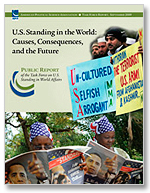 America’s global standing has become a central concern of U.S. leaders and citizens. U.S. leaders, regardless of party, pledge to “restore U.S. standing” as a central goal of America’s foreign policy agenda. Standing has been the subject of widespread public discussion and intellectual debate.
America’s global standing has become a central concern of U.S. leaders and citizens. U.S. leaders, regardless of party, pledge to “restore U.S. standing” as a central goal of America’s foreign policy agenda. Standing has been the subject of widespread public discussion and intellectual debate.
Yet despite all this attention, three issues fundamental to standing have been relatively ignored:
- What is standing and how has it varied?
- What causes standing to rise and fall?
- What impact does standing have on U.S. foreign policy?
This task force answers these questions by synthesizing what we now know about U.S. standing and/or identifying what we need to know to understand better a topic of clear national and international importance
“Standing” refers to the United States’ position with respect to credibility, morality, and stature in world affairs. U.S. standing may well vary in different substantive areas of international politics such as military affairs, economic relations, and political relations. The task force explores U.S. standing in three different settings:
- international society and organizations,
- other regions and countries, and
- American polity.
Two causal questions related to standing are central. The first concerns the origins of standing. If it is true that U.S. standing is declining (rising), then any policy response to that change presumes knowledge of the causes of that loss (increase). What factors most influence standing? The second question concerns the consequences of standing. How does it matter in foreign policy? We assess the impact of different types of standing on national aims and international outcomes.
The task force concisely presents what political scientists know about the causes and consequences of U.S. standing in world politics. We did not presume that there was a deep literature or easy answers on these issues. Indeed it is because we use this (or related) term(s) so often, yet so little is known, that standing appears is a compelling topic to study. By distilling the things we know on U.S. global standing, as well as what we do not know, we hope to advance public discourse and deliberation, and to benefit political action and policymaking in the United States and abroad.
Available now!
Short report (pdf)
Long report (pdf)

Task Force Leadership
- Peter J. Katzenstein, Cornell University, APSA President (2008-09)
- Jeffrey W. Legro, University of Virginia, Chair
Task Force Members
International Organizations/Society
- Martha Finnemore, George Washington University (Group Head)
- Daniel Drezner, Tufts University
- John Ikenberry, Princeton University
- Barbara Koremenos, University of Michigan
- Erik Voeten, Georgetown University
Country/Regions
- Jack Snyder, Columbia University (Group Head)
- Victor Cha, Georgetown University
- Maya Chadda, William Patterson University
- Giacomo Chiozza, Vanderbilt University
- Marc Lynch, George Washington University
- Kathleen McNamara, Georgetown University
- Etel Solingen, University of California, Irvine
U.S. Polity
- Peter Trubowitz, University of Texas (Group Head)
- Matthew Baum, Harvard University
- Meena Bose, Hofstra University
- Margaret Hermann, Syracuse University
- Henry Nau, George Washington University
- Stephen Krasner, Stanford University